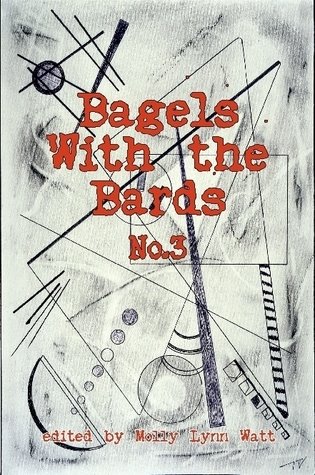
(JOHN TLUMACKI/PHOTO)
There's no shortage of conversation when the Bagel Bards meet.
By Danielle Dreilinger, Globe Correspondent
It was 10:30 on a Saturday morning and cacophony filled the Davis Square Au Bon Pain. Thirty members of the “Bagel Bards” entirely occupied half the café, leaning in to carry on 11 separate conversations. Cofounder Doug Holder pushed his glasses on top of his head. 79-year-old, beret-topped Bert Stern of Somerville signed copies of his new book. Latecomers stole chairs.
Supposedly no one cares about poetry anymore. But here, every week, poets rule — feeding their muse with shop talk and cinnamon-chip scones.
And now the five-year-old group has a permanent symbolic home: management has allowed members to hang a plaque in their corner behind the muffin case.
The meeting place “kind of started with my obsession,” Holder admitted. He’d written several books inspired by the legendary Harvard Square Au Bon Pain. (He also liked that its name sounded a bit literary, being French.)
He and Harris Gardner of Boston, 62, started the group after a friend said poets outside the academy needed company and support. They met for a year in a now-defunct Harvard Finagle a Bagel before relocating to Au Bon Pain, alternating between Somerville and Central Square, Cambridge cafes before settling into Davis a year ago.
Holder’s friend was right: Bards said the meetup filled a need. “It’s such a great thing to come to,” said Elizabeth Quinlan, 63, who regularly travels from Roslindale.
“A lot of people are saying if you’re a poet you have to do things in isolation,” said Amy Tighe of Somerville, 51, a realtor, poet, and former storyteller. “This can really carry you.”
True, they typically talk of practical matters, not prosody -- “Chapbooks, poetry, publishers” -- said Irene Koronas of Cambridge, 66 -- and computer fixes, and her daughter’s strange rash. The rhinestones on her glasses sparkled.
Second-time attendee Reza Tokaloo of Somerville brought printouts of his new work. When he left, they were scattered across the table next to stacks of the poets’ own books plus classics like T. S. Eliot's "The Waste Land" and Rilke’s "Letters to a Young Poet."
He would soon learn. “Sometimes the newcomers will try that. And we’re polite,” Koronas said.
Holder seemed to have four arms as he simultaneously joked about nominating a friend for a Pulitzer (“It costs $50,” he said. “Then he can say he was nominated”), pointed out a Bard who’d been featured on NPR, sold his new collection of interviews to Gardner, and stumped for his upcoming New York reading.
Two Bards reviewed poetry festival paperwork. Another was overheard telling a photographer that sure, there were copies on hand of “… the Bagel Bards anthology but this is MY book.”
Indeed, they’re a well-published lot -- often by each other. Holder, Somerville’s de facto poet laureate, runs Ibbetson Street Press, hosts a cable-access poetry show, and writes a column for the weekly Somerville News.
After joining the group, several others Bards started their own shoestring-budget presses, including Cervena Barva by Gloria Mindock of Somerville and Steve Glines’s Littleton-based Wilderness House.
“This group has spawned a lot of activity. A lot of presses, getting read, getting acknowledged,” said Koronas, poetry editor for Holder's and Glines’s magazines. Now, she said, “This is it for the small poetry scene.”
Still, Saturdays remain notably low-pressure and no-mystique. Some higher-profile poets like Afaa Michael Weaver frequent the group but competition isn’t even a side dish.
“It’s not particularly bragging here to say you’re a poet,” said Molly Lynn Watt of Cambridge, 71, who puts together an annual Bagel Bard anthology—a publication that is open to all regulars.
It’s “a celebration when someone comes out with a book,” Quinlan said.
Showing up doesn’t guarantee publication beyond the anthology. “Some of us are really good and some of us aren’t,” Tighe said.
There seemed to be only a few people that didn't join the party: other patrons.
“We don’t have any positive response from other customers because it’s noisy, they take a lot of space,” said associate manager Sujata Pun. Café-goers gave the boisterous Bards a wide berth. Outnumbered, most took their coffee to go.
Until the Bards' plaque claimed to their corner for good, Barbara Bialick’s poem held its place. Where the prosaic might see a quick pick-me-up, Bialick took the poets’ position:
“The circus breads of life
on display around me
are tempting me to have my own fiesta…”
The Bagel Bards take up a large corner of Au Bon Pain.



